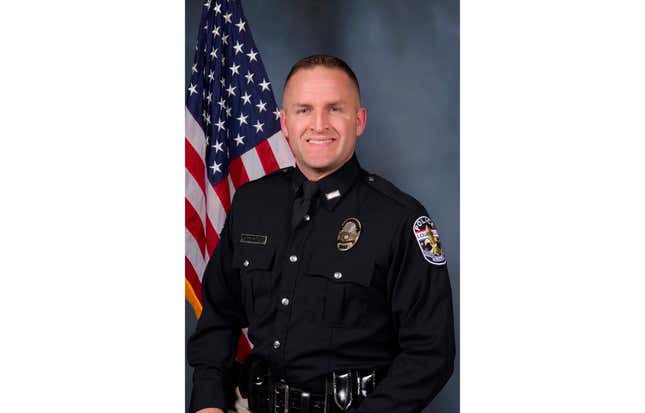
More than 100 days after Brett Hankison barged into 26-year-old Breonna Taylor’s home in Louisville, Ky., shooting and killing her, the former Louisville Police narcotics officer has been fired from the department.
Hankison, who is also the subject of two sexual assault investigations, was officially fired Tuesday (his impending termination was announced last week). Hankison is, thus far, the only officer involved in Taylor’s death to be removed from the force.
In Hankison’s termination letter, Chief of Police Robert J. Schroeder wrote that Hankison “displayed an extreme indifference to the value of human life” when he fired 10 shots upon forcefully entering her home in March. Some of his shots entered a neighbor’s apartment, notes the letter, which was shared on Twitter (h/t ABC News).
His actions violated at least two of LMPD’s guidelines: its Obedience to Rules and Regulations, as well as its Use of Deadly Force rules.
“In fact the ten rounds you fired were into a patio door and window which were covered with material that completely prevented you from verifying any person as an immediate threat or more importantly any innocent persons present,” the letter states.
The letter also mentions Hankison’s previous disciplinary issues, including a reprimand last year in which he was found to have engaged in “reckless conduct that injured an innocent person.”
“I find your conduct a shock to the conscience. I am alarmed and stunned you used deadly force in this fashion,” the police chief continued, addressing Hankison directly. “Your actions have brought discredit upon yourself and the Department.”
The other two officers who fired their weapons in Taylor’s apartment, Sgt. Jonathan Mattingly and Officers Myles Cosgrove, remain on administrative reassignment. The same is true of the detective who requested the “no-knock” warrant on Taylor’s apartment as part of a narcotics investigation, Joshua Jaynes.
Since Taylor’s killing on March 13, the Louisville Metro Council unanimously passed “Breonna’s Law,” which bans LMPD from seeking and using “no-knock” warrants, and requires that body cameras be turned on for every search. But despite weeks of protests, meetings and vigils, very little has changed both in Taylor’s case and with regard to the LMPD.
As local ABC affiliate WHAS11 reported, the Metro Council has no plans to defund the police, despite the repeated and specific calls to do so from local organizers and activists. Instead, the council plans to re-prioritize how the department spends its $190.5 million budget. According to their proposed plan, $5 million of the police budget (about 2.6 percent) would go toward the Louisville Affordable Housing Trust Fund (LAHTF), which converts vacant and abandoned properties into “direct purchase or least-to-purchase opportunities,” reports WHAS. Another $2.5 million would go to programs that support home repair, fix up vacant and abandoned properties, and increase homeownership. Louisville will not cut any city funds from the LMPD.
“We absolutely don’t want to fund bad behavior but I do want to fund good, positive, productive behavior,” Councilwoman Barbara Sexton- Smith told the local TV station about LMPD. “I do want them to have the appropriate equipment, and to make sure they have the funding available. I want them to have the training they so very much deserve and need.”
The argument that so many Black Lives Matter protesters are making is that training police officers does little to reform a system that is either fundamentally broken or—more likely—working exactly as intended. Removing Hankison from his role as a police officer is a little slice of the justice Taylor’s family and those saying her name have in mind. But more than three months after Taylor’s killing, the kind of transformative justice that Taylor’s family and the city of Louisville need—that they have ceaselessly demanded—is still far on the horizon.

